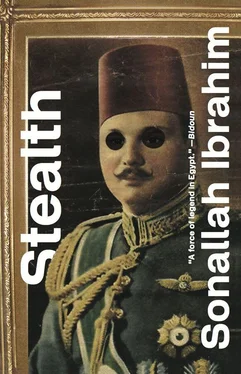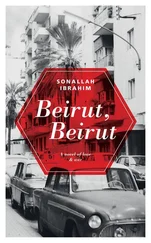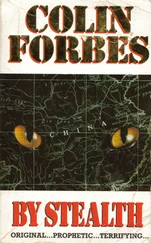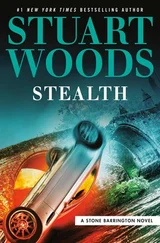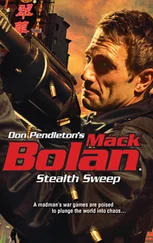“Van Heusen.” He takes a pack of Blair’s no. 3 cigarettes out of his pocket.
Father asks him: “Did you switch?”
He says: “It’s ten piastres cheaper than Three Fives brand.” He offers one to father, but he turns it down, saying: “I never switch.” Uncle Fahmi lights one with his Ronson lighter. I hand him the ashtray and he puts it between them on the bed. He asks: “Hey! Do you have a backgammon set?” Father shakes his head and says no. He says he used to play every night at “The Parliament,” his regular coffeehouse, back in the days of the real estate trade. He sighs and begins to talk mistily about that time. The broker would walk from table to table with a map. He would throw a glance over at it and pick a piece of property. He didn’t pay a cent. You could barely throw your dice or take a sip of your whisky before the broker would come back and announce he had sold your property for a good price. You would collect your profit without breaking a sweat. More than once, he would go back home in a horse-drawn cab with a purse full of gold coins in his hand.
He asks about Sameera. Uncle Fahmi answers that she’s worried about Nadeen because she is so rebellious. She wants to go alone with her fiancé to the cinema. Father says: “So what?” He turns to me and I pretend to be absorbed in my reading. He goes on: “So what if they kiss each other or something? Doesn’t she love him and plan on marrying him? Then that’s that. You need to get over this old-timey talk. It’s a new world.”
Uncle Fahmi lights another cigarette. He says: “To tell the truth, Khalil Bey, I’m here about a personal matter.” I lift my head up from the book and prick up my ears. Father turns toward me. I put my head back down. I start to move my lips and run the pen over the paper. Uncle Fahmi complains about Nabila wearing him out. He says: “I give her what she wants right away. I bought her an electric washing machine with a revolving element that holds 52 liters. I brought in a telephone line. I got an Electrolux fridge.”
“Is it electric?”
“It works with oil, gas, or electricity.”
Father asks “So what’s she angry about?”
Uncle Fahmi leans his head towards father. I prick up my ears. Father turns towards me. He orders me to go study in the hall. I pick up my notebook and open up the door that has been left open a crack. I bump into Fatima who runs away quickly. I leave the door open a crack. I stand near it. Fatima stands in front of the sideboard. She makes herself busy filling the spice bins. I hear Uncle Fahmi say: “She doesn’t want to sleep next to me, and she says I’ve lost my appetite for women.”
Father says: “Is it true?”
“Listen, Khalil Bey. You understand what happens when a woman turns down her husband.”
“What do you mean?”
Fahmi raises his voice in anger: “She’s the one who killed my passion.”
“Keep your voice down.”
Fahmi goes on without paying attention: “I can’t go on like this. I’ve been wearing these same clothes for a week. I can’t change because all my clothes are back there.” We walk back and forth over the pavement in front of the Jewish school. The street is dark. Our apartment’s lights are on. The bedroom window is open. We stop on the pavement in front of it. Mother and grandma are going through the dressers. They pull out clothes and pack up suitcases.
Fatima and I look at each other. We listen and hear father’s voice: “Where are you staying now?”
“At a friend’s place. I can’t go on like this.”
“Okay. Don’t panic.”
“Now I’m just fine. I get up in the morning feeling just great.”
He goes on talking in a low voice. Father’s voice is direct: “That’s just a morning cycle. It doesn’t really mean anything.” They stop talking. Father calls to me. I wait a second, then go in. He says: “Go get your English textbook. Show your Uncle Fahmi the words that you didn’t know.”
I drink a cup of cinnamon with milk. Fatima makes me the sandwich I’m going to take with me. Butter and strawberry jam. She wraps it in a sheet of newspaper and puts it next to the satchel on the desk. I put on my clothes and pick up the satchel, but I leave the sandwich. Father tells me to put on a sweater because it has turned cold. Father adjusts himself in his chair. He complains that his foot falls asleep. Fatima squats down on the floor and starts to rub his feet for him. I leave the room. I take out my key as I watch them from the corner of my eye. I put the key in my pocket and leave the door open a crack. I open the apartment door. I prick up my ears. No movement. My heart starts to pound. I shut the door with a bang and run under the table. I put the satchel in front of me. I hear the sound of the bedroom door closing. Father’s voice: “Be sure to lock it.” Fatima’s voice: “I can’t find the key.” “Okay. It doesn’t matter. Just come over here.”
I raise my head, being careful not to hit it on the bottom of the table top. I open the satchel and take out the sand. I scatter it on the floor. I write on it with my finger: “O Koreishite, Sharaibite, Yahoubite.” I sit on the sand. I keep a careful eye on the cockroach nests. I repeat in a soft voice: “Take their eyes and their sight and make them, O servant, these names in the sea wrapped in darkness that they might not see me. ‘Deaf are they and blind, For they cannot see.’ ” Then I am quiet. I listen. No sound.
I come out carefully from under the table. I leave the satchel on top of the sideboard and go over to the door to the bedroom. My heart is pounding hard. I put my eye to the keyhole. I don’t see anything. I turn my head and press my ear against it. I don’t hear anything. I set my glasses back on the center of my nose. I gently turn the doorknob and push it just a little. I repeat to myself in my head: “O Koreishite, Sharaibite, Yahoubite.” I take a step inside, confident that they won’t be able to see me. Shining up at me is my father’s bare bottom between the raised up, naked legs of Fatima. She is lying on the bed with her head down on the pillow. I take a step closer. I hear her say: “Oh well. It looks like you don’t want it right now.” He brings his mouth close to hers. She turns her mouth to the side. He tries to kiss her. She looks shocked. He tells her: “Open your mouth.” She doesn’t do it. He says: “Grab hold of it.” She asks: “Like this?” He says: “Yes.” After a second she says: “It’s no use.” I come closer. She turns toward me. She screams: “Holy shit!” She pushes him to the side and gathers up her clothes. She tries to sit up. Father turns his head. He shouts: “What the hell are you doing here?” I cry out: “Damn you both!”
I turn to leave the room. I snatch my satchel from the sideboard. I open the front door. Slam it hard behind me. I go out to the street and cross over to the other side. I walk along the narrow side street that runs parallel to the boulevard with the tramcar. I make it to school right at the end of the national anthem. I join in with the line as everyone heads up to the classrooms.
English class. Then natural sciences: properties of liquids, the theorem of Archimedes. We go down to the lab to do a chemistry experiment. The lab supervisor isn’t there and the Bunsen burner doesn’t work. The teacher uses the blackboard to explain extraction of oxygen from potassium chloride to us.
The bell for the short recess rings. The students get ready to go down to the playground. They all gather around Maher. His hair is parted from the left. His shirt collar is open and overlaps the collar of his suit coat. He is carrying some strange thing in his hand. He says it is not a camera, but a 3-D lens viewer. “Stereoscope videomaster.” We have to work hard to repeat the name. He says that it grants its user the power, from its lens, to see the world as it really is. It shows 3-D pictures in natural color to make animals and surroundings clearer. The teacher comes over to us and puts out his hand to take the viewer. He looks into it and says: “Wow. It’s as though the giraffe is standing right in front of you.” Maher shows us the slot where you can load a card of slides. He says there are 94 cards and each one has seven full-color scenes. The teacher asks how much it costs. Maher is full of pride: “100 piastres.”
Читать дальше
